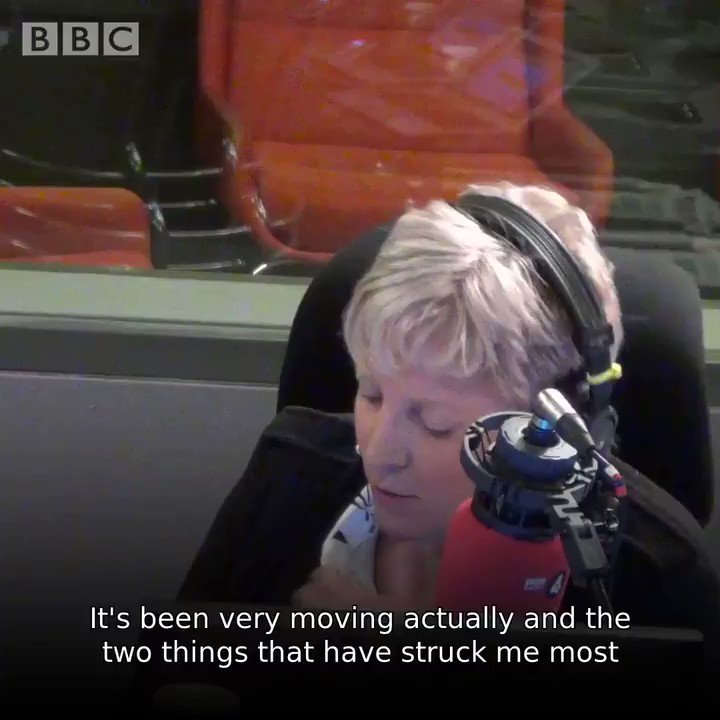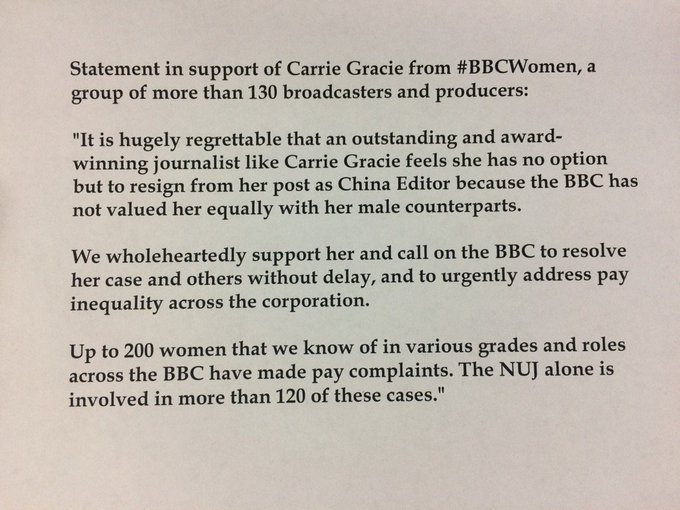Carrie Gracie says support for BBC pay protest shows hunger for change
The BBC’s China editor, Carrie Gracie, says the support she has received for resigning in protest over unequal pay demonstrates a hunger for change.
Within hours of posting an open letter to licence fee payers citing a “crisis of trust” at the BBC over men being paid more than women, Gracie has been sent scores of messages of support from a string of prominent broadcasters and politicians.
Despite being the subject of a news story, Gracie took the unusual step of going ahead with a scheduled appearance as presenter of the BBC’s Today programme on Radio 4.
She told the programme how much she had been moved by the support. Interviewed by her co-presenter John Humphrys, whose £600,000-plus pay packet is at least four times more than Gracie’s, she said: “The support that I’ve had in the last few hours over this … does speak to the depth of hunger for an equal, fair and transparent pay system.”
She added: “What is lovely for me is that people are mentioning my China work, because I would not wish to be remembered for ever as the woman who complained about money.”
Humphrys interrupted her to say “too late, too late”, before going on to praise his colleague’s stint as China editor.
Gracie added: “I want to be remembered as the person who did some fine China work, and enough people are saying that for me to feel that that will not get buried as a result of all this.”
Sarah Montague, the least well paid of the regular Today programme presenters, was one of 130 broadcasters and producers to sign a message of support backing Gracie’s protest.
It urged the BBC to “urgently address pay inequality across the corporation”. And it pointed out that 200 women across the BBC had made pay complaints.
Many of the BBC’s most prominent names also backed Gracie’s stance and hailed her bravery.
Rival broadcasters also backed her protest. Lindsey Hilsum, international editor at Channel 4 News, criticised the BBC for not valuing their “fluent Chinese speaking China editor” and “renowned authority”.
A number of MPs also voiced their support, including the shadow work and pensions secretary, Debbie Abrahams, former deputy party leader Harriet Harman, and former home secretary Jacqui Smith.
Labour’s Jess Phillips tweeted: “Here’s my suggestion. I’ll pay 50% less of my licence fee. I love and would die in ditch for the BBC but this isn’t the gender pay gap even, this is equal pay issue and it’s illegal to pay her less than men doing equivalent work. SORT IT OUT.”
The Tory MP Nadine Dorries wrote on Twitter: “What a brave lady she is. Absolutely no way any woman under any circumstances should be paid less than any man for doing the same job.”
Labour peer Lord Foulkes, who demanded that Gracie reveal how much she was paid during a live interview about MP’s pay in 2009, said he agreed with her campaign for pay parity.
Michelle Stanistreet, general secretary of the National Union of Journalists, said it was “determined to hold the BBC to account”.
She said: “It’s no surprise that NUJ member Carrie Gracie is not prepared to stay silent about the injustice wrought upon her by her own employer.
“Her letter to licence fee payers makes it clear what a difficult decision it has been to speak out about what she calls a crisis of trust at the BBC, but why it is vital that the British public are clear about why she has been forced to resign her post as China Editor and return early to London,” Stanistreet said in a statement.
The journalist, who has been with the BBC for 30 years and described leading its China coverage since 2004 as “the greatest privilege of my career”, stated her concerns in a letter addressed to the “BBC audience”.
She accused the corporation of a “secretive and illegal pay culture” after it was revealed two-thirds of its stars earning more than £150,000 were male.
A BBC spokesman said: “Fairness in pay is vital. A significant number of organisations have now published their gender pay figures showing that we are performing considerably better than many and are well below the national average.
“Alongside that, we have already conducted an independent judge-led audit of pay for rank and file staff which showed ‘no systemic discrimination against women’.
“A separate report for on-air staff will be published in the not too distant future.”
Carrie Gracie says support for BBC pay protest shows hunger for change
![Carrie Gracie says support for BBC pay protest shows hunger for change]() Reviewed by TechNow
on
January 08, 2018
Rating:
Reviewed by TechNow
on
January 08, 2018
Rating:









No comments